Planning Perspectives
A look at life and finance from every angle.
From personal to professional, from family to financial, there are many facets to your life. Yet, each is interconnected. Planning Perspectives is a source of ideas and information to help you make the most of them all, all together.
3 Investment Lessons from ‘The Life Changing Magic of Tidying Up: The Japanese Art of Decluttering and Organizing.’
January 23, 2017 BlogWe are less separate from our environment than we can ever imagine.
In this article, I want to share three personal investment lessons I learned from reading Marie Kondo’s “The Life Changing Magic of Tidying Up: The Japanese Art of Decluttering and Organizing”. It’s a remarkable book in both its depth and simplicity. The author advises the reader on humble practices that serve to clear one’s home and mind, and in doing so she also dispels some common mistakes the average organizer makes.
Do not underestimate the power of this little book. It can be touched on again and again for tidy nuggets of advice, tactics and inspiration.
The book fits nicely into one of my favourite categories of learning: applying lessons from one sphere into another. In life, we become used to seeing things the way we have always seen them, and so I say it’s a good idea to step back, often, and with childlike curiosity take an outsider’s perspective. Here I summarize three principles from Marie Kondo’s book and reinterpret them from the perspective of investing.

Lesson 1: Put your house in order.
Why: A common mistake that both active and would-be investors make is that they use a very dangerous word: “someday”. Many individuals with whom I speak have investment somewhere on their personal horizon, and it’s usually after a laundry-list of goals, to-dos, career moves, crises, vacations, cars, dog-spa visits, homes, kids, Netflix binging… you get the picture.
The problem is that someday is not an actual day. Someday is a dirty excuse that keeps being pushed further and further away like that messy closet you’ll get around to cleaning. The mess is just a physical representation for your inability to address the real underlying issue: lack of focused, purposeful and intentful action.
In order to invest properly, you need to take the time to declutter and tidy up your life.
Part of the magic of tidying up, as Kondo puts it, is that when your space is decluttered, your mind opens up to new possibilities and you feel as if you have stepped into a new reality. In fact, you have, because we are less separate from our environment than we can ever imagine.
The same principle applies to your life as a whole. That is, to plan for the future, you need to accurately see where you stand now, and where you need to be later: this can only be done once you have organized and clarified your personal life and finances. Only after you put your house in order does your mind reflect the full potential of your reality. Now, with your house in order, you will be reenergized and with clarity will be able to see the investment future you need, and you will be able to take the correct actions.

Lesson 2: Discard first, organize second.
Why: Kondo repeats the mantra that to put your house in order is to first discard that what you don’t need, and that which no longer sparks joy. Discarding is a natural act as all things are always changing, and trying to hold on to the unholdonable is a recipe for confusion, mess, and despair. We keep what we think we need because we fear for a future without it. This fear is an illusion. Discarding is a tough but necessary step towards upgrading your personal and financial life.
Carrying messy debt? Consolidate it. Overdue bills? Pay them. Old subscriptions? Cancel them. Unhealthy habits? Drop them. Knowingly paying too much? Stop it. Emotionally attached to equities that underperformed? Sell them. The world changed and now your investment thesis no longer makes sense. Move on.
It’s okay to give things up.
In fact, our financial system has built in rewards for discarding underperforming stocks: it’s called tax loss selling. In a society that doesn’t reward “giving up”, we forget that there is enormous power in letting things go, and in order to have a tidy, fresh, and accurate financial life, the first step is discard what you don’t need.
It’s hard to let go, but it is the most effective agent of change.

Lesson 3: Do it all at once.
Why: This is perhaps the most challenging and most valuable aspect of the ‘KonMari’ method. The common dogma of tidying is that you do a little bit today, a little bit tomorrow and then you will soon have a tidy house. Makes sense, right? It’s a trap.
Tidying day by day will leave you with a lifetime of chores, a restless mind, and probably a sore back. Kondo suggests that you put your house in order all in one go. Bite the bullet, discard, and get to work. Once your house has been decluttered and organized with everything in its place- your life will be simplified, and your mind freed to ponder more important things like puppy pics on Instagram, establishing a RESP for your kids, or starting that new business for which you never had time.
The same principle applies to investing. Don’t wait and invest a little here and a little there. The reality is you will probably forget, become distracted or dissuaded by temporary conditions, and time will work against you. Put your house in order, discard, pay off debt, establish what is important to you, set up your investment accounts, work with an advisor, and follow the plan. As life moves forward, your dollars will know where they safely need to be, the plan will become automated, and your mind will become free of worry as your financial life becomes decluttered, clean and beautiful.
There is a reason the “The Life Changing Magic of Tidying Up” has sold over 3 million copies worldwide. Tidying up is a simple philosophy that when done right, can indeed have magical life-changing effects. Applying the lessons to your financial life can similarly have incredible benefits.
Put your house in order, discard what you don’t need, and do it all at once.
A place for everything and everything in its place, keep on course, and make adjustments twice per year or as necessary.
Written by:
Temmy Lewis
Financial Advisor
Toronto
Temmy.Lewis@raymondjames.ca